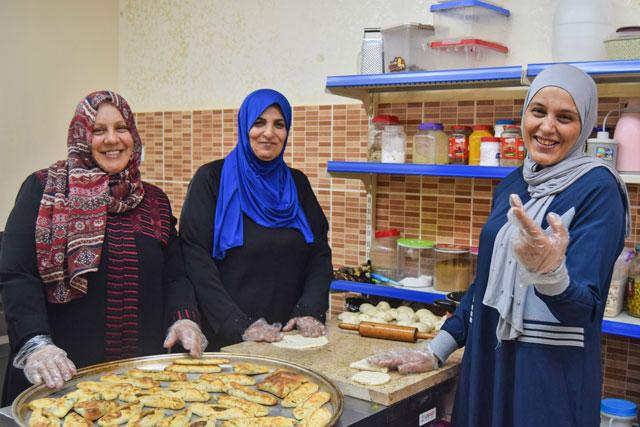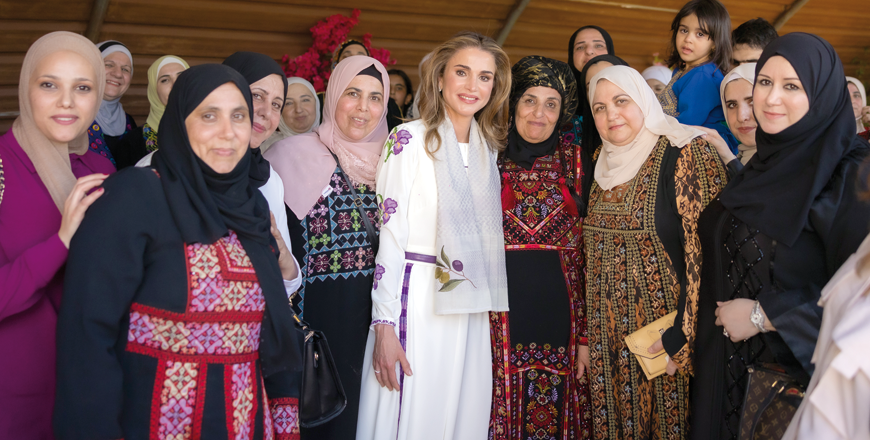You are here
Female-run kitchen ‘delights’ Irbid’s producers, consumers
By Camille Dupire - Oct 24,2018 - Last updated at Oct 24,2018

Um Mohammad is seen with some of her production kitchen employees in Irbid recently (Photo courtesy of USAID LENS)
AMMAN — When her husband moved to Oman some 20 years ago, Firyal Kofahi (or Um Mohammad as she is known), was left to take care of her eight children alone.
The loving and hardworking woman started cooking as a hobby, “something she had been doing since she was in fourth grade for her family, friends and neighbours”.
In her home village of Hawar near Irbid, Um Mohammad was known for her various authentic and traditional dishes, appetizers and sweets. “People used to praise my Gras Al Eid [Eid cookies] a lot. One professor in the village even told me once, ‘Um Mohammad! Keep making those cookies and go outside the village where the real market is!’” she recounted .
However, the mother of eight found it nearly impossible to leave her village, both out of fear of societal judgment and of the financial risks she would encounter.
It is a fear long forgotten for Um Mohammad, as she now owns a successful production kitchen in Irbid, (a kitchen run by a group of women who work together to meet market demand) that produces authentic, home-style recipes from the north of Jordan, which are dying out in most urban areas.
“I was told it was shameful of me to leave. But I wanted to rely on myself and become independent,” she remembered, adding, “work was difficult, at first, and moving to Irbid was a strange and intense experience. But people were kind”.
Her catering dream was made possible through the help of seven local organisations a decade ago, but she was still restrained to a small place, with the essentials a refrigerator and an oven, and four other women.
What really turned Um Mohammad’s business around came in 2015, when an official from the Irbid Agriculture Department, and another from the USAID Jordan Local Enterprise Support Project (LENS) invited her and several other women to a meeting explaining the grants USAID LENS was providing to small businesses in the food sector.
“I applied, of course, but did not expect much,” she remembered. The same night, however, she was informed that her grant application had been accepted, setting the first step towards her and her employees’ bright future.
“We were all incredibly happy — we daydreamed about the future and just could not believe it!”
The USAID LENS grant, which targets home-based businesses and production kitchens, covered the costs of rent and purchasing the equipment necessary for the growth and expansion of these businesses, according to USAID LENS officials.
Um Mohammad moved to a bigger kitchen, hired more women and bought the equipment she needed.
“The USAID LENS grant helped a lot,” Um Mohammad stated, noting, “not only did the revenue of the kitchen increase by almost 90 per cent, I now have the financial means to send my eight children to university”.
She shares the revenues with the women she works with, some in dire financial situations being widows, divorcees or refugees.
Haya, a Syrian refugee who arrived in Jordan six years ago, said: “At that time, I was in desperate need to make income because my husband couldn’t work. Um Mohammad was an angel. She took me in, taught me everything she knew and helped my family survive.”
After training the women and securing their transportation, Um Mohammad supports her 18 full-time employees in becoming independent and making their own income.
She also works with 30 home-based part-timers who cannot easily leave their homes.
In an area where employment for women is hard to come by, Um Mohammad is helping vulnerable women regain a sense of worth and a decent living through work.
She also hires a number of young male university students who assist her with delivery and operations.
Since she launched her social media accounts, Um Mohammad said that “a lot of women contact me and ask me to hire them. I tell all of them, ‘Once I have the chance,’ and I will, ‘I’ll hire you.’”.
Launched to encourage the long-term economic growth and development potential of marginalised Jordanian communities through supporting small and micro enterprises across Jordan, the five-year USAID LENS project has supported large numbers of home-based, artisanal food producers in six governorates across Jordan over the past three years, according to its website.
Related Articles
AMMAN — Her Majesty Queen Rania visited Firyal Kofahi’s home-based kitchen in Irbid’s Hawar village on Wednesday as part of her efforts to s
AMMAN — Abeer, a 36-year-old Jordanian woman and mother of four, was forced to take control of her family’s finances after the death of her
AMMAN — With the growing interest in home-based businesses, there still remains hesitation when it comes to obtaining work permits, accordin

















